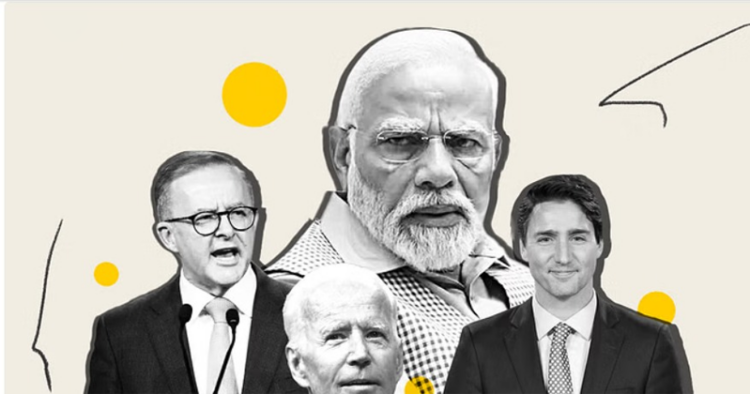Recently, several reports were published in different parts of the world which accused India of running espionage operations. India has rejected all such claims.
Earlier this week, the Australian Broadcasting Corporation (ABC) stated that Indian “spies” have been expelled from Australia after allegedly being caught trying to steal sensitive, classified and critical information about defence projects and other security related details.
Similarly, American based The Washington Post has reported and named purported RAW official who allegedly ordered the assassination of Khalistani supporter and separatist Gurpatwant Singh Pannun in the US.
Another report by the UK based The Guardian alleged that New Delhi had ordered the killing of 20 individuals involved in terrorist activities in India, in Pakistan. Also claimed that India is influenced by agencies like the KGB and Mossad.
The Canadian media have been reporting on the killing of another Khalistani, Hardeep Singh Nijjar. According to Canadian PM Trudeau, India is perhaps the mastermind.
India has staunchly denied the allegations. It has responded qualitatively differently in each case, which can further indicate reflections on broader policy positions and current strategic considerations.
India simply refused to entertain the “absurd” and “politically motivated” remarks by the Canadian PM, also accused Canadian government to harbour terrorists on their soil.
New Delhi has described the reports published by the Australian media as “speculative”. In a report of The Washington Post, the Ministry of External Affairs (MEA) spokesperson said that the report makes baseless and unwarranted commentaries on a serious matter and made sure to point out that the probe is ongoing into the security concerns shared by the US government on nexus of organised criminals, terrorists and etc.
The major allegations and accusations came from the member countries of Five eyes intelligence sharing network, which involves the US, the UK, Canada, Australia and New Zealand.
India shares a strategic partnership with the US and Australia, coupled with important evolving groups like the Quad. They have robust and reciprocal relationships and invested heavily on each other. However, with the Pannun assassination plot they have drawn a line and conveyed to India to not take them for granted. It appears like the strategic circles of India has faced an unprecedented setback and it seems like an orchestrated efforts by the Five Eyes to pushback India’s covert operations.
However, the Indian foreign policy doctrine of the current regime has considered espionage and overseas operations in the interest of the national security and should not be seen with suspicions. This aligns with the principles of the ancient Indian manual of statecraft, the Arthashastra. The Arthashastra has recognised espionage as a fully professional secure and an inalienable organ of the state.
Former top spy, Vikram Sood also wrote in his book, ‘The Unending Game: A Former RAW Chief’s Insight Into Espionage’, that intelligence should be defined as a secret activity that is conducted at the behest of the government, which further assists the government in taking decisions to prevent potential threats and priorities national interests and security by providing knowledge in advance. This helps the nations to be prepared and equipped under any circumstance and avoid any ambush in the foreseeable future.
It is well known theory, or rather, a fact today, amongst the strategic circles and groups that lost all the countries that had spies in other countries. The foreign media is blowing this out of proportion and hunting India. It is a convoluting stance portrayed by the Five Eyes that all states spies, and when they are being spied on, they get annoyed.
Despite the Five Eyes have strong ties with India, which goes beyond the regular convergences of political and economic bandwidth, and also includes intelligence sharing and defence,. Also perceives India as a heavy counterweight to their common enemy, China. They do not appreciate India’s espionage operations. They school India for not indulge in such acts, where they have been far too long involved while running covert operations. This is blatant hypocrisy.
If the Five Eyes have the right to paramount their national interests, so why should India be subservient. It should be able to map out its national interests and national security plan of actions without any inhibitions. The relations that India has established with the west and its allies have been at its best in the recent decades, but as we know how such relations are always in flux. There is no guarantee. Even though India shares a good rapport and regard in the world today, it will be a mistake to lower the guard or to even think to scale down the intelligence activity.





















Comments